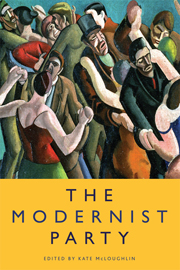Book contents
- Frontmatter
- Contents
- A Note of Thanks
- The Guest List
- Introduction: A Welcome from the Host
- 1 ‘The dinner was indeed quiet’: Domestic Parties in the Work of Joseph Conrad
- 2 Prufrock, Party-Goer: Tongue-Tied at Tea
- 3 Party Joyce: From the ‘Dead’ to When We ‘Wake’
- 4 ‘Looking at the party with you’: Pivotal Moments in Katherine Mansfield's Party Stories
- 5 Virginia Woolf's Idea of a Party
- 6 Proustian Peristalsis: Parties Before, During and After
- 7 ‘Ezra through the open door’: The Parties of Natalie Barney, Adrienne Monnier and Sylvia Beach as Lesbian Modernist Cultural Production
- 8 ‘Indeed everybody did come’: Parties, Publicity and Intimacy in Gertrude Stein's Plays
- 9 The Interracial Party of Modernist Primitivism and the Black ‘After-Party’
- 10 The Party In Extremis in D. H. Lawrence's Women in Love
- 11 Bohemian Retrospects: Ford Madox Ford, Post-War Memory and the Cabaret Theatre Club
- 12 ‘Pleasure too often repeated’: Aldous Huxley's Modernity
- Index
1 - ‘The dinner was indeed quiet’: Domestic Parties in the Work of Joseph Conrad
Published online by Cambridge University Press: 05 April 2014
- Frontmatter
- Contents
- A Note of Thanks
- The Guest List
- Introduction: A Welcome from the Host
- 1 ‘The dinner was indeed quiet’: Domestic Parties in the Work of Joseph Conrad
- 2 Prufrock, Party-Goer: Tongue-Tied at Tea
- 3 Party Joyce: From the ‘Dead’ to When We ‘Wake’
- 4 ‘Looking at the party with you’: Pivotal Moments in Katherine Mansfield's Party Stories
- 5 Virginia Woolf's Idea of a Party
- 6 Proustian Peristalsis: Parties Before, During and After
- 7 ‘Ezra through the open door’: The Parties of Natalie Barney, Adrienne Monnier and Sylvia Beach as Lesbian Modernist Cultural Production
- 8 ‘Indeed everybody did come’: Parties, Publicity and Intimacy in Gertrude Stein's Plays
- 9 The Interracial Party of Modernist Primitivism and the Black ‘After-Party’
- 10 The Party In Extremis in D. H. Lawrence's Women in Love
- 11 Bohemian Retrospects: Ford Madox Ford, Post-War Memory and the Cabaret Theatre Club
- 12 ‘Pleasure too often repeated’: Aldous Huxley's Modernity
- Index
Summary
Joseph Conrad's reputation predominantly rests on his proto-modernist exploration of the individual male consciousness. Throughout his fiction, protagonists such as Charlie Marlow, Lord Jim, Razumov and Axel Heyst are preoccupied with (frequently failed) quests for identity, isolated figures grappling with a troubled psychology, trying to make sense of their situation in a hostile or unwelcoming community. In this context, parties (other than political ones) do not immediately spring to mind as familiar locations or sources for Conrad's narratives, and when they do occur they are not always markers of social harmony in his work. His emphasis on the relationship between individual and society in his narratives often means that parties subvert rather than confirm their conventional generic function as closure of comedy. Instead, Conrad is highly sceptical of the social gathering. Rather than presenting the party as a convenient setting for communal engagement, he uses the occasion of social interaction to comment on a number of moral anxieties, the concealment of hidden agendas, frequently showing the ways in which individuals are persuaded, incited or bullied into following interests not quite their own. Through the setting of the party he examines: the individual's dominance over the group (Peter Ivanovitch's revolutionary gatherings at the Château Borel in Under Western Eyes (1911)); political machinations (the pub gatherings of anarchists in The Secret Agent (1907)); or issues of female identity.
- Type
- Chapter
- Information
- The Modernist Party , pp. 25 - 44Publisher: Edinburgh University PressPrint publication year: 2013



